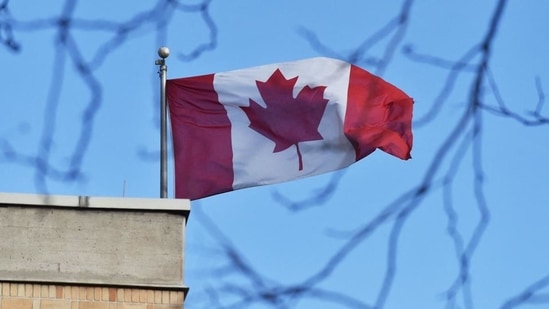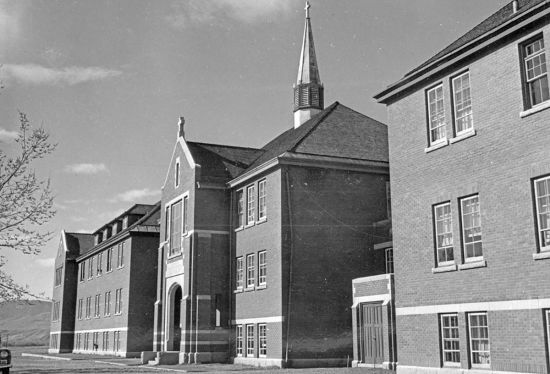Canada acknowledges 'colonial genocide', but will it set a precedent in the Commonwealth?
By Alan Weedon
Posted SunSunday 7 JulJuly 2019 at 4:57am, updated WedWednesday 31 JulJuly 2019 at 8:09am
AP: Adrian Wyld)
Share
For centuries, First Nations peoples have been seeking the truth about colonisation.
Key points:
Canada acknowledged it has had a continuous intention to "destroy Indigenous peoples"
It noted that current genocide definitions fail to incorporate Indigenous perspectives
The Commonwealth and other bodies are flawed when asked to correct colonial genocide
In the decades after the first contact with Indigenous peoples, many history books told a story of friendly conquest, neglecting to broach the uncomfortable truths of massacres and cultural destruction that allowed Europeans to establish colonies in almost all corners of the globe.
It was only in the latter part of the 20th century that many non-indigenous academics, governments, and invested citizens sought to work alongside Indigenous peoples to challenge the inherited stories of settlement.
Last month, Canada became the latest country to admit to "race-based genocide" against its Indigenous peoples.
The acknowledgement was made in a wide-ranging report of a three-year national inquiry into more than 4,000 missing and murdered Canadian Indigenous women, girls and 2SLGBTQQIA (two-spirit, lesbian, gay, bisexual, transgender, queer, questioning, intersex and asexual people), otherwise known as the MMIWG report.
Two-spirit is a term that describes Canadian Indigenous people who "assume cross- or multiple-gender roles, attributes, dress and attitudes for personal, spiritual, cultural, ceremonial or social reasons".
In a supplementary report explaining its rationale for the genocide ruling, MMIWG commissioners noted Canada had "displayed a continuous policy … to destroy Indigenous peoples physically, biologically, and as social units".
Experts say Canada's decision is significant and may reverberate across the Commonwealth's settler-colonial states, including Australia and New Zealand, where Indigenous peoples are still subject to considerable socio-economic disadvantages when compared to non-Indigenous peers.
The theme for this week's NAIDOC celebrations, 'Voice, Treaty, Truth' is also a reminder of the fact that Australia is the only Commonwealth country to not have a formal treaty with its Indigenous peoples, though the Northern Territory and Victoria are pursuing regional treaties.
While the concrete outcomes of Canada's report are yet to be seen, it presents governments of all stripes — including Australia's — with a great body of evidence showing the impacts of colonisation on Indigenous peoples and could set a new precedent for how Indigenous communities in the Commonwealth could pursue truth and justice at home.
Genocide includes 'lethal and non-lethal acts'
Library and Archives Canada)
The United Nations Genocide Convention defines the crime as any "committed intent to destroy, in whole or in part, a national, ethnical, racial or religious group", through killing, grievous bodily harm, the manipulation of the group's living conditions, restrictions on births, or the forcible transfer of children from one group to another.
Marking Aboriginal massacres
In 1828, the bodies of about 30 Aboriginal men were thrown from a cliff in Tasmania's far north west. The Cape Grim massacre is not officially commemorated, but some think it's time to mark the day.Read more
But the Canadian report noted that the current definition fails "to incorporate Indigenous perspectives" and that genocide includes both "lethal and non-lethal acts".
In Australia, the 20th century brought with it the suffering of the Stolen Generations, where Indigenous children were taken from their parents and raised in state-run institutions or Mission Schools, while Canada had the Sixties Scoop, which saw First Nations, Inuit and Métis children forcibly taken from their homes and adopted into non-Indigenous homes.
Kutcha Edwards, a Mutti Mutti musician and host of 3CR Radio's Beyond the Bars, told the ABC that he became a child of the Stolen Generations simply because he was "born black in this country".
"The irony is that I was not born a citizen of this place," he said.
"In 1967, the magic wand [full rights] was then bestowed upon Aboriginal people to make us constituents of the Crown — we were sovereign people prior to that.
"Because of this magic wand, I was forcibly taken from my mother and father and taken to a children's home in Melbourne's eastern suburbs."
'Genocide in Australia is ongoing'
Supplied: Victorian Government)
Jill Gallagher AO, a Gunditjmara woman from western Victoria and the Victorian Treaty Advancement Commissioner, told the ABC genocide against Indigenous Australians had cast a long shadow over her own family.
A NAIDOC week primer
Here's what you need to know about Australia's national celebration of Aboriginal and Torres Strait Islander cultures.Read more
"We've been looking at a facility to look after my 93-year-old mother and she lived through the Mission School Era," she said.
"She said to me, 'Jill, don't tell them that I'm Aboriginal'."
Ms Gallagher added that the disparity between Indigenous and non-Indigenous people in the rates of homelessness, unemployment, children in out-of-home care, and the ability to practise their culture, even today, exemplified indirect genocide.
She added that Indigenous Australians are the most incarcerated people per capita in the world.
Supplied: NCCA)
The latest Australian data on out-of-home care showed that Indigenous children in 2017 were 10 times more likely to be taken away from their families than non-Indigenous children, prompting Australia's first Aboriginal children's commissioner, Andrew Jackomos, to call the situation a "national disaster".
Jack Latimore, a Birpai writer and editor for National Indigenous Television (NITV) News, told the ABC that many people with power in Australia still failed to see the indirect forms of genocide.
"Academics of a certain age and socio-economic bracket do not have a conception of genocide being a nuanced thing — it's very much a body count," Mr Latimore said.
"Genocide or cultural genocide in Australia is ongoing and it's part of the colonial project."
Will Canada's report prompt bids for justice abroad?
US National Archives and Records Administration / Her Majesty's Stationery Office)
Jennifer Balint, an associate professor specialising in criminology and genocide at the University of Melbourne, told the ABC that obtaining justice for past or continuing genocide in any legal system was "extremely exhausting with very limited success".
She said prosecuting charges of genocide involved proving "bad intent" — as in the case of Rwanda, and Jews during World War II — whereas history had shown that genocide also happened under "so-called good intent" such as colonial policies of cultural assimilation.
In the Commonwealth, there has only been one instance where justice has been delivered to victims of colonial violence — in 2012, surviving Kenyan torture victims took on the British Government and won compensation.
AFP: Shaun Curry)
According to the MMIWG report that was backed by Prime Minister Justin Trudeau, Canada is in breach of a number of human rights statutes and agreements — including the Commonwealth Charter, where member states must ensure "equality and respect for the protection and promotion of civil, political, economic, social and cultural rights" of all citizens.
Australia is also a party to the Commonwealth Charter, which could potentially put Australia in the same boat as its Commonwealth ally, although no report like the MMIWG has been commissioned on these shores.
When asked by the ABC if Canada's report would prompt justice claims within the Commonwealth, Secretary-General Patricia Scotland said all Commonwealth members were "encouraged to take practical action" regarding the "promotion and protection of the human rights of Indigenous peoples".
While there is no reference to colonisation or decolonisation in the Commonwealth Charter, the United Nations has pressed member states to continue decolonisation efforts — a call first made in 1960.
Within international law, Dr Balint explained that the MMIWG report's findings may provide a framework for similar initiatives, as they document the "testimonies of what the destruction was".
YOUTUBEMMIWG Chief Commissioner Marion Buller outlines the report's 231 calls for justice.
"Being attentive to different ways in which individuals and communities are destroyed — and how they understand that destruction — that's what makes this report so important," she said.
Whose responsibility?
But for First Nations peoples looking at the Canadian decision from abroad, such as Mutti Mutti musician Mr Edwards, the move illustrates just how much catch-up other Commonwealth countries still have to do.
"When a government acknowledges that they have practised cultural genocide, you have to ask yourself, why there, and not here?"
The spokesperson for the chief commissioner of the MMIWG report, Marion Buller, said Ms Buller was not able to comment as the commission's office was dissolved days after the ABC's request.
The Australian Attorney-General did not respond to the ABC's requests by deadline.
Posted 7 JulJuly 2019, updated 31 JulJuly 2019
Share
Related Stories
Canada's Indigenous women and girls victims of a 'genocide'
'The massacres don't seem to stop': The expanding map of frontier violence
Canada turns spotlight on 'Stolen Sisters' deaths
More on:
AUSTRALIA
CANADA
UNITED KINGDOM
INDIGENOUS POLICY
INDIGENOUS (OTHER PEOPLES)
INDIGENOUS (ABORIGINAL AND TORRES STRAIT ISLANDER)
LAWS
HUMAN
STOLEN GENERATIONS
COLONIALISM
ROYAL AND IMPERIAL MATTERS
INTERNATIONAL LAW
 Canada's residential school system, which forcibly separated indigenous children from their families, constituted "cultural genocide," a six-year investigation into the now-defunct system found in 2015.(AFP)(Representative image)
Canada's residential school system, which forcibly separated indigenous children from their families, constituted "cultural genocide," a six-year investigation into the now-defunct system found in 2015.(AFP)(Representative image)


